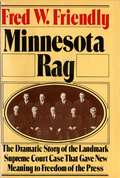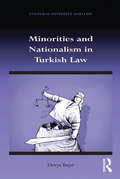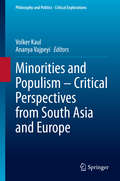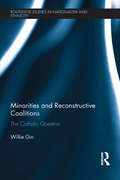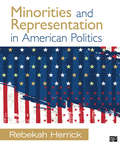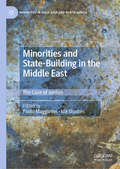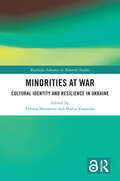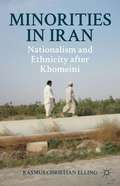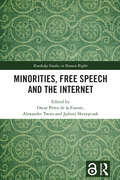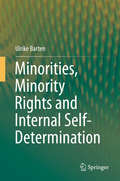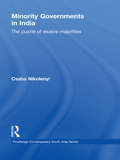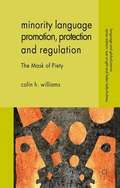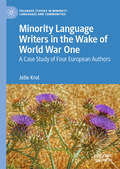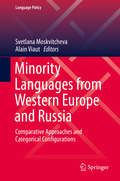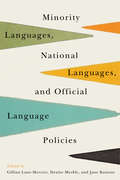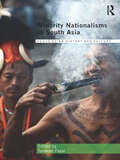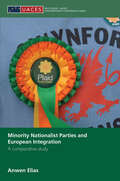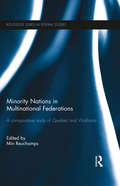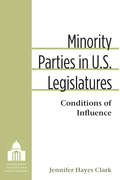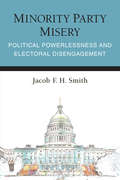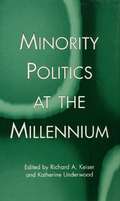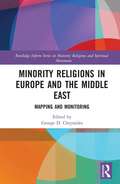- Table View
- List View
Minnesota Rag: The Dramatic Story of the Landmark Supreme Court Case That Gave New Meaning to Freedom of the Press
by Fred W. FriendlyAcademic, Scholarly, Research
Minorities and Nationalism in Turkish Law (Cultural Diversity and Law)
by Derya BayirExamining the on-going dilemma of the management of diversity in Turkey from a historical and legal perspective, this book argues that the state’s failure to accommodate ethno-religious diversity is attributable to the founding philosophy of Turkish nationalism and its heavy penetration into the socio-political and legal fibre of the country. It examines the articulation and influence of the founding principle in law and in the higher courts’ jurisprudence in relation to the concepts of nation, citizenship, and minorities. In so doing, it adopts a sceptical approach to the claim that Turkey has a civic nationalist state, not least on the grounds that the legal system is generously littered by references to the Turkish ethnie and to Sunni Islam. Also arguing that the nationalist stance of the Turkish state and legal system has created a legal discourse which is at odds with the justification of minority protection given in international law, this book demonstrates that a reconstruction of the founding philosophy of the state and the legal system is necessary, without which any solution to the dilemmas of managing diversity would be inadequate. Adopting an interdisciplinary approach, this timely book will interest those engaged in the fields of Middle Eastern, Islamic, Ottoman and Turkish studies, as well as those working on human rights and international law and nationalism.
Minorities and Populism – Critical Perspectives from South Asia and Europe (Philosophy and Politics - Critical Explorations #10)
by Ananya Vajpeyi Volker KaulThis volume assembles renowned scholars to address, for the first time, the relationship between minorities and populism in South Asia and Europe from a critical perspective. Despite the very different and to some extent opposite historical and political trajectories, there is today a convergence on nationalist affirmation and on majoritarian politics between South Asia and Europe. In India, the Hindu majority rebels against wide-ranging minority rights anchored in the Constitution. In Europe, the refugee crisis and Islamic radicalization bring to the forefront the postcolonial legacy. Despite all rhetoric, there are obvious dangers of majoritarianism. Populist parties are divisive, partisan, disregard minority rights, engage in lynching, social division, stigmatization and exclusion, turning minorities into second-class citizens. There is a profound structural connection between minorities and the current rise of populism in India and Europe. But there remains a deep perplexity and also anxiety: Does the presence of minorities necessarily have to trigger majoritarian policies? Are there no solutions to this dilemma? Many observers considered multicultural policies and affirmative action programs in India as a possible model for Europe to adopt in order to achieve greater integration. But eventually they seem to have failed. Why so? Are multiculturalism and the recognition of differences still options today? On the other hand, most scholars in India typically reject the European model of liberal democracy and secularism as impracticable in India and locate the reason for the current malaise in the west. But is liberal democracy really so bad in dealing with pluralism? This volume, collecting a selection of the Reset DOC Venice-Padua-Delhi dialogue series, is going to answer two fundamental questions. First, what precisely is the nexus between minorities and populism in South Asia and Europe? Starting from those case studies, the authors will also draw some general theoretical inferences about the nature of populism. Secondly, given the dangers of populism for minorities, the volume will look for the most adequate and feasible solutions.
Minorities and Reconstructive Coalitions: The Catholic Question (Routledge Studies in Nationalism and Ethnicity)
by Willie GinAs with Muslims today, Catholics were once suspected of being antidemocratic, oppressive of women, and supportive of extremist political violence. By the end of the twentieth century, Catholics were considered normal and sometimes valorized as exemplary citizens. Can other ethnic, racial, and religious minorities follow the same path? Minorities and Reconstructive Coalitions provides an answer by comparing the stories of ethnic Catholics’ political incorporation in Australia, Canada, and the United States. Through comparative and historical analysis, the book shows that reconstructive coalitions, such as labor and pan-Christian moral movements, can bring Catholics and Protestants together under new identities, significantly improving Catholic standing. Not all coalitions are reconstructive or successful, and institutional structures such as regional autonomy can enhance or inhibit the formation of these coalitions. The book provides overviews of the history of Catholics in the three countries, reorients the historiography of Catholic incorporation in the United States, uncovers the phenomenon of minority overrepresentation in politics, and advances unique arguments about the impact of coalitions on minority politics.
Minorities and Representation in American Politics
by Rebekah L. HerrickMinorities and Representation in American Politics is the first book of its kind to examine underrepresented minorities with a framework based on four types of representation—descriptive, formalistic, symbolic, and substantive. Through this lens, author Rebekah Herrick looks at race, ethnic, gender, and sexual minorities not in isolation but synthesized within every chapter. This enables readers to better recognize both the similarities and differences of groups’ underrepresentation. Herrick also applies her unique and constructive approach to intergroup cooperation and intersectionality, highlighting the impact that groups can have on one another.
Minorities and Representation in American Politics
by Rebekah L. HerrickMinorities and Representation in American Politics is the first book of its kind to examine underrepresented minorities with a framework based on four types of representation—descriptive, formalistic, symbolic, and substantive. Through this lens, author Rebekah Herrick looks at race, ethnic, gender, and sexual minorities not in isolation but synthesized within every chapter. This enables readers to better recognize both the similarities and differences of groups’ underrepresentation. Herrick also applies her unique and constructive approach to intergroup cooperation and intersectionality, highlighting the impact that groups can have on one another.
Minorities and State-Building in the Middle East: The Case of Jordan (Minorities in West Asia and North Africa)
by Idir Ouahes Paolo MaggioliniThis book offers fresh insights to enhance and diversify our understanding of the modern history of the state and societies in today’s Jordan, while also providing examples of why and how scholars can challenge the static and discursively government-minded approaches to minorities and minoritisation – especially the traditional emphasis on demographic balances. Despite its small size and initial appearance of homogeneity, Jordan provides an excellent case of a dynamic, relational, historically contingent and fluid approach to ethnic, political and religious minorities in the context of the imposition of a modern state system on complex and varied traditional societies. The editors and contributors present dynamic and relational perspectives on the status of and historical processes involved in the creation and absorption of minority groups within Jordan.
Minorities at War: Cultural Identity and Resilience in Ukraine (Routledge Advances in Minority Studies)
by Elmira Muratova and Nadia ZasanskaThis collection focuses on Ukraine’s ethno-cultural minorities who in recent years have undergone forced displacement, emigration, the destruction of familiar ways of life, and a transformation of identity and language behaviour. The book examines the impact of Russia’s war against Ukraine, which began with the annexation of Crimea and the war in Donbas in 2014. It shows what happens to the cultural identities of minority groups and considers the mechanisms and components of their resilience in times of crisis. Key themes addressed include minorities’ collective memory and coping strategies, mobilisation and humanitarianism, forced displacement, and the preservation of identity. While most works on the Russo-Ukrainian war focus on the international context and the causes of the war and its humanitarian consequences for the population of Ukraine and the region as a whole, this book seeks to mainstream the issue of ethno-cultural minorities, which is often neglected in the coverage of this type of conflict. The book will be of interest to academics, researchers and policy-makers working in the areas of Law, Political Science, Anthropology, Human Geography, Religious Studies and War and Peace Studies.
Minorities in Iran
by Rasmus Christian EllingBased on the premise that nationalism is a dominant factor in Iranian identity politics despite the significant changes brought about by the Islamic Revolution, this cross-disciplinary work investigates the languages of nationalism in contemporary Iran through the prism of the minority issue. This is particularly evident among intellectuals and state representatives concerned with how to tackle the mounting ethnic mobilization among minorities today. Through a close and contextualized reading of a unique and broad-ranging material in Persian, this book shows how the minority issue is crucial to the future of Iran.
Minorities, Free Speech and the Internet (Routledge Studies in Human Rights)
by Alexander Tsesis Oscar Pérez de la Fuente Jędrzej SkrzypczakMinorities, Free Speech and the Internet explores the regulation of free speech online and offline. Views are divided as to how much regulation of the Internet is appropriate. Some argue that it should be an unregulated space for free content. On the other hand, in many democracies online hate speech, harassment and xenophobia are prohibited and punished. This book provides a forum for leading international scholars to address domestic and comparative dimensions of this complex legal conundrum. Firstly, the authors analyse the free speech and internet regulations in different legal cultures, including the USA, Europe, China and Russia. Secondly, they study fake news, extreme right speech and the implications of hate speech on pluralistic society. Thirdly, they examine different case law addressing minority sensibilities, historical discriminations, offensive propaganda and other issues particularly concerning minorities and free speech. This book will be of interest to students and scholars interested in the topics of hate speech and minorities, democracy, misinformation and debates about the Internet, as well as political science researchers.
Minorities, Minority Rights and Internal Self-Determination
by Ulrike BartenThe book questions the classic idea of self-determination - the right to self-determination is a right of peoples, not of minorities - by examining the content of the right to self-determination and the content of minority rights. Self-determination has four dimensions: the political, the economic, the social and the cultural dimensions. Minorities have minority rights that touch on most aspects of life as a member of a minority. If there is an overlap between minority rights and the different dimensions of self-determination, the concept that the right to self-determination is only applicable to peoples loses credibility. No global and general conclusion is envisaged; there are restrictions in place. The work is limited to the European framework and is further restricted to classic minorities. The argument is based on a legitimacy and justice approach. The analysis in this book shows that some minority rights overlap with the different dimensions of internal self-determination. In short, classic minorities in Europe have a right to internal self-determination.
Minority Governments in India: The Puzzle of Elusive Majorities (Routledge Contemporary South Asia Series)
by Csaba NikolenyiIndia's national parliamentary elections typically result in the election of majority parliaments and the formation of a single-party majority government. However, India’s national party system has changed beyond recognition since the parliamentary elections of 1989. The Congress Party has lost its dominant party status; the number of political parties that contest elections, win seats in parliament and gain cabinet portfolios have increased; minority governments and cabinet instability have become regular features of parliamentary politics. This book addresses each of these aspects of party system transformation in India by applying the analytical techniques of rational and social choice theory. Challenging conventional wisdom, the book argues that the number of parties in India has increased as a result of the unexpected consequences of the constitutional amendment of 1985 that was conceived to curtail party defections. Although the Congress Party no longer dominates the new multi-party system, it still retains a pivotal role in deciding which coalitions may form viable and stable minority government. The Indian case study is theoretically driven and it is readily comparable with other parliamentary federations where minority governments are often formed, such as Canada, and the book finds that these processes are also present in the sub-national party systems of the states, however, with greater variation.
Minority Language Promotion, Protection and Regulation
by Colin H. WilliamsThis is an analysis of the promises and contradictions surrounding contemporary minority language policy. It draws on theoretical and real-world perspectives and interviews with key players within European institutions together with field work undertaken principally in Ireland, Scotland, Wales, the Basque Country, Catalonia and Canada.
Minority Language Writers in the Wake of World War One: A Case Study of Four European Authors (Palgrave Studies in Minority Languages and Communities)
by Jelle KrolThis book presents a comparative literary study of the works of four writers working in European minority languages - Frisian, Welsh, Scots and Breton. The author examines the different strategies employed by the four writers to create distinctive literary fields for their languages in the interwar era when self-determination had been promised to national minorities, finding that each had to make some degree of a step backwards into the past to enable them to make a leap forward. The book also discusses the problems resulting from this oscillation between traditionalism and modernism, drawing on concepts such as Pascale Casanova's 'littératures combatives' to make sense of these minority languages and communities within the wider European context. This study will be of interest to students and scholars of minority languages - particularly the four explored here - as well as twentieth-century and comparative literature, multilingualism, and language policy.
Minority Languages from Western Europe and Russia: Comparative Approaches and Categorical Configurations (Language Policy #21)
by Svetlana Moskvitcheva Alain ViautThis book offers a comparative approach within a general framework of studies on minority languages of Western Europe and Russia and former Soviet space, focusing on linguistic, legal and categorization aspects. It is connected to a comparative study of the semantic contents of the terms referring to the different categories of these languages. The volume features multidisciplinary approaches, first linguistic (sociolinguistic and semantic) and legal, and investigates the limits of country-to-country comparisons, mirroring cases from France, Spain, and China with their counterparts from Soviet and later Russian configurations. Special examples, from a region as Ingria and a country as Tajikistan, help to contextualize this approach. In addition, the notion of migration languages, also minority languages, is studied in bilingual contexts, both from external (German, Greek, Chinese ...) and internal origins (Chuvash), linked to the urbanization in contemporary societies that has fostered the presence of these languages in major cities.
Minority Languages, National Languages, and Official Language Policies
by Jane Koustas Gillian Lane-Mercier Denise MerkleIn a context where linguistic and cultural diversity is characterized by ever-increasing complexity, adopting official multilingual policies to correct a country's ethno-linguistic, socio-economic, and symbolic imbalances presents many obstacles, but the greatest challenge is implementing them effectively. To what degree and in what ways have official multilingualism and multiculturalism policies actually succeeded in attaining their goals? Questioning and challenging foundational concepts, Minority Languages, National Languages, and Official Language Policies highlights the extent to which governments and international bodies are unable to manage complex linguistic and cultural diversity on an effective and sustained basis. This volume examines the principles, theory, intentions, and outcomes of official policies of multilingualism at the city, regional, and national levels through a series of international case studies. The eleven chapters – most focusing on lesser-known geopolitical contexts and languages – bring to the fore the many paradoxes that underlie the concept of diversity, lived experiences of and attitudes toward linguistic and cultural diversity, and the official multilingual policies designed to legally enhance, protect, or constrain otherness. An authoritative source of new and updated information, offering fresh interpretations and analyses of evolving sociolinguistic and political phenomena in today's global world, Minority Languages, National Languages, and Official Language Policies demonstrates how language policies often fail to deal appropriately or adequately with the issues they are designed to solve.
Minority Leader: How to Lead from the Outside and Make Real Change
by Stacey AbramsA personal and empowering blueprint―from one of America’s rising Democratic stars―for outsiders who seek to become the ones in charge <p><p> Leadership is hard. Convincing others―and often yourself―that you possess the answers and are capable of world-affecting change requires confidence, insight, and sheer bravado. Minority Leader is the handbook for outsiders, written with the awareness of the experiences and challenges that hinder anyone who exists beyond the structure of traditional white male power―women, people of color, members of the LGBTQ community, and millennials ready to make a difference. <p> In Minority Leader, Stacey Abrams argues that knowing your own passion is the key to success, regardless of the scale or target. From launching a company, to starting a day care center for homeless teen moms, to running a successful political campaign, finding what you want to fight for is as critical as knowing how to turn thought into action. Stacey uses her experience and hard-won insights to break down how ambition, fear, money, and failure function in leadership, while offering personal stories that illuminate practical strategies. <p> Stacey includes exercises to help you hone your skills and realize your aspirations. She discusses candidly what she has learned over the course of her impressive career: that differences in race, gender, and class are surmountable. With direction and dedication, being in the minority actually provides unique and vital strength, which we can employ to rise to the top and make real change. <p> <b>A New York Times Bestseller</b>
Minority Nationalisms in South Asia (Routledge South Asian History and Culture Series)
by Tanweer FazalSouth Asia is the theatre of myriad experimentations with nationalisms of various kinds - religious, linguistic, religio-linguistic, composite, plural and exclusivist. In all the region’s major states, officially promulgated nationalism at various times has been fiercely contested by minority groups intent on preserving what they see as the pristine purity of their own cultural inheritance.This volume examines the perspective of minority identities as they negotiate their terms of co-existence, accommodation and adaptation with several other competing identities within the framework of the ‘nation state’ in South Asia. It examines three different kinds of minority articulations – cultural conclaves with real or fictitious attachments to an imaginary homeland, the identity problems of dispersed minorities with no territorial claims and the aspirations of indigenous communities, tribes or ethnicities.The essays in this volume offer a rich menu: the evolution of Naga nationalism, the construction of the territory-less Sylheti identity, the debates over Pashtun nationalism in Pakistan, the evolution of Muslim nationalism in Sri Lanka, the politics of religious minorities in Bangladesh and Pakistan, the making of minority politics in India, and questions of Islam and nationalism in colonial India. It is an eclectic mix for students of nationalism, politics, modern history and anyone interested in the evolution of South Asia.This book was published as a special issue of South Asian History and Culture.
Minority Nationalist Parties and European Integration: A comparative study (Routledge/UACES Contemporary European Studies)
by Anwen EliasDifferent survey-based and case study research has shown that, since the 1980s, minority nationalist parties have become increasingly supportive of European integration. However, this account of minority nationalist party attitudes towards Europe is problematic in several respects. This book makes a major contribution to the academic literature by undertaking a comparative study of the attitudes of minority nationalist parties towards European integration. The volume provides: A systematic analysis of the ways in which minority nationalist party attitudes towards European integration have evolved from 1979 to 2005. Original empirical data on hitherto under-researched minority nationalist parties in Wales, Galicia and Corsica. Major new insights into the European attitudes of minority nationalist parties. This book challenges the general assumption in the academic literature that the minority nationalist party family will always be pro-European and demonstrates how it needs to be revised in light of the evidence provided by this study. It will be of strong interest to students and scholars interested in minority nationalism, the Europeanisation of political parties, comparative research on regional politics and in contemporary debates about nationalism.
Minority Nations in Multinational Federations: A comparative study of Quebec and Wallonia (Routledge Studies in Federalism and Decentralization)
by Min ReuchampsMultinational federations rest on the coexistence of two or more nations within a single polity. Within these federations, minority nations play a significant role as their character differs from the other building blocks of the federation. This edited volume offers a comprehensive comparison of two such minority nations - Quebec in Canada and Wallonia in Belgium - which exemplifies many dimensions, themes and issues highly resonant to the study of federalism and regionalism across the globe. Quebec and Wallonia have experienced several decades of federal dynamics where both regions have had to find their way as a minority nation in a multinational federation. For those studying federalism and regionalism their importance lies in a number of characteristics, but principally in the fact of these minority nations have transformed into mini-states with fully fledged legislative powers within their federation. This book seeks to study the specific dynamics within these small worlds and between them and the rest of the federation. This text will be of key interest to students and scholars of federalism, nationalism and regionalism, comparative politics and policies, political ideas and social movements.
Minority Nations in the Age of Uncertainty
by Alain-G. GagnonFor thirty years, Alain-G. Gagnon has been one of the world's leading experts on federalism and multinational democracies. In Minority Nations in the Age of Uncertainty, he presents an articulate and accessible introduction to the ways in which minority nations have begun to empower themselves in a global environment that is increasingly hostile to national minorities.Comparing conditions in Quebec, Catalonia, and Scotland, Gagnon offers six interrelated essays on national minorities, processes of accommodation, and autonomy and self-determination within a modern democratic context. Based on a long career of scholarly study and public engagement, he argues that self-determination for these "nations without states" is best achieved through intercultural engagement and negotiation within the federal system, rather than through independence movements.Already translated into fifteen languages from the original French, Minority Nations in the Age of Uncertainty is an essential text on the theory of multinational federalism and the politics of minority nations.
Minority Parties In U. S. Legislatures: Conditions Of Influence
by Jennifer ClarkThis study of the influence minority parties wield is both a major work of political science scholarship and a timely examination of an issue with real consequences for the functioning of democratic legislatures and the creation of legislation. Challenging conventional assumptions that the majority party dominates the legislature, Jennifer Hayes Clark investigates precisely the ways in which--and under what conditions--members of the minority party successfully pursue their interests. For this study, Clark collects fine-grained data from both the U. S. Congress and state legislatures to get a close look at three key points in the legislative process: committee assignments, bill cosponsorship, and roll-call votes. She finds that minority party members are not systematically excluded throughout the policymaking process. Indeed, their capacity to shape legislative decision-making is enhanced when party polarization is low, when institutional prerogatives are broadly dispersed rather than centralized, and when staff resources are limited. Under these conditions, bipartisanship bill cosponsorship and voting coalitions are also more prevalent. With the sharp increase of partisan polarization in state legislatures and in Congress, it is essential that scholars--as well as voters and reformers--understand how and when a minority party can effectively represent constituents.
Minority Party Misery: Political Powerlessness and Electoral Disengagement (Legislative Politics And Policy Making)
by Jacob F. SmithThis book examines the role of minority party status on politicians’ engagement in electoral politics. Jacob Smith argues that politicians are more likely to be engaged in electoral politics when they expect their party to be in the majority in Congress after the next election and less likely when they anticipate their party will be in the minority. This effect is particularly likely to hold true in recent decades where parties disagree on a substantial number of issues. Politicians whose party will be in the majority have a clear incentive to engage in electoral politics because their preferred policies have a credible chance of passing if they are in the majority. In contrast, it is generally difficult for minority party lawmakers to get a hearing on—much less advance—their preferred policies, particularly when institutional rules inside Congress favor the majority party. Instead, minority party lawmakers spend most of their time fighting losing battles against policy proposals from the majority party. Minority Party Misery examines the consequences of the powerlessness that politicians feel from continually losing battles to the majority party in Congress. Its findings have important consequences for democratic governance, as highly qualified minority party politicians may choose to leave office due to their dismal circumstances rather than continue to serve until their party eventually reenters the majority.
Minority Politics at the Millennium (Contemporary Urban Affairs)
by Richard A. Keiser Katherine UnderwoodFirst published in 2000. Routledge is an imprint of Taylor & Francis, an informa company.
Minority Religions in Europe and the Middle East: Mapping and Monitoring (Routledge Inform Series on Minority Religions and Spiritual Movements)
by George D. ChryssidesMinority religions, not only New Religious Movements, are explored in this innovative book including the predicament of ancient religions such as Zoroastrianism, ‘old new’ religions such as Baha’i, and traditional religions that are minorities elsewhere. The book is divided into two parts: the gathering of data on religious minorities ("mapping"), and the ways in which governments and interest groups respond to them ("monitoring"). The international group examine which new religions exist in particular countries, what their uptake is, and how allegiance can be ascertained. They explore a range of issues faced by minority religions, encompassing official state recognition and registration, unequal treatment in comparison with a dominant religion, how changes in government can affect how they fare, the extent to which members are free to practise their faith, how they sometimes seek to influence politics, and how they can be affected by harassment and persecution. Bringing together debates concerning the social and political issues facing new religions in Europe and the Middle East, this collection extends its focus to Middle Eastern minority faiths, enabling exposition of spiritual movements such as the Gülen Movement, Paganism in Israel, and the Zoroastrians in Tehran.
